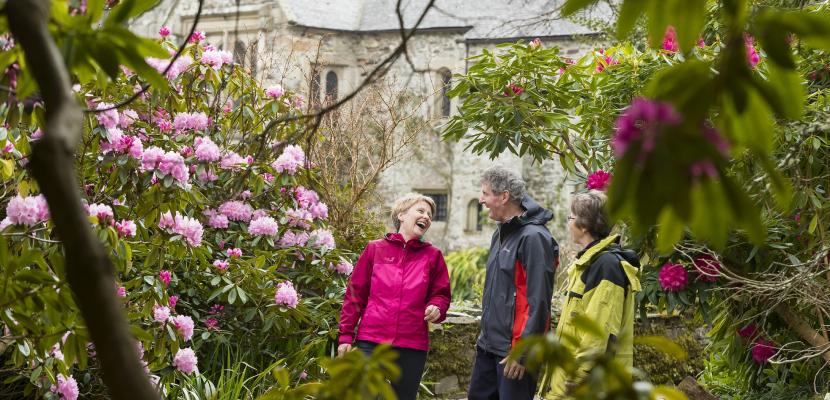Image

A Natural Health Service: Social prescribing in the heritage sector
Published on 20 May 2020

United Kingdom
This is the good practice's implementation level. It can be national, regional or local.
About this good practice
Doctors spend almost one fifth of their consultation time dealing with social rather than health issues. One solution is social prescribing, which enables them to connect people with community groups and services for practical and emotional support.
Since its foundation, the National Trust has believed in the health benefits of its places. From volunteering in a beautiful garden to just enjoying the peace and relaxation of a visit. From meeting people and finding a new role in life to exercise, fun and fresh air.
In 2019 the Trust formed a partnership with a North Devon surgery to test this theory and pilot a new approach to social prescribing.
The surgery refers people with long-term conditions, loneliness or mental health issues to the Trust, which organises weekly activities: A gentle walk or countryside management work, such as habitat restoration, repairing coastal paths or beach cleaning.
These have proven, amongst other things, to reduce stress levels, increase physical health and improve self-esteem. The Trust benefits too in having more volunteers to carry out conservation work and deepen engagement with the local community. And from the surgery’s perspective, social prescribing helps people take greater control of their own health and well-being, and eases the burden on clinical services.
The main stakeholders are healthcare providers like doctors, nurses and other agencies. The main beneficiaries are members of the public and the National Trust.
Since its foundation, the National Trust has believed in the health benefits of its places. From volunteering in a beautiful garden to just enjoying the peace and relaxation of a visit. From meeting people and finding a new role in life to exercise, fun and fresh air.
In 2019 the Trust formed a partnership with a North Devon surgery to test this theory and pilot a new approach to social prescribing.
The surgery refers people with long-term conditions, loneliness or mental health issues to the Trust, which organises weekly activities: A gentle walk or countryside management work, such as habitat restoration, repairing coastal paths or beach cleaning.
These have proven, amongst other things, to reduce stress levels, increase physical health and improve self-esteem. The Trust benefits too in having more volunteers to carry out conservation work and deepen engagement with the local community. And from the surgery’s perspective, social prescribing helps people take greater control of their own health and well-being, and eases the burden on clinical services.
The main stakeholders are healthcare providers like doctors, nurses and other agencies. The main beneficiaries are members of the public and the National Trust.
Resources needed
Although the pilot was funded through a grant of £45,000 from the Integrated Better Care Fund, social prescribing does not need to cost much, particularly as the benefits are reciprocal. People referred via the healthcare system can be inserted into existing programmes and volunteer activity.
Evidence of success
The pilot project demonstrated successful outcomes for patients, healthcare providers and the National Trust, including improvements in the mental health and well-being of patients, vital conservation work undertaken and cost-effective use of healthcare resources.
In 2019, the surgery made over 600 referrals (not all to the National Trust) but now Trust sites across the country are providing more opportunities for patients to tackle some of the most challenging social and health conditions.
In 2019, the surgery made over 600 referrals (not all to the National Trust) but now Trust sites across the country are providing more opportunities for patients to tackle some of the most challenging social and health conditions.
Potential for learning or transfer
Heritage sites appeal to visitors because they are safe, comfortable and welcoming. But they could often do more to embrace a broader diversity of people with specific health and well-being needs.
There is currently significant interest in the impact of natural and cultural heritage on health and well-being across the sector. Indeed the Trust’s own research into ‘Places that Make Us’ proves the strong emotional connection between people and places.
The potential therefore for heritage to play a role in preventive care anywhere in the world is great. And the growing body of experience should make it easier to develop partnerships with others already operating in this field.
Whilst the best partnerships are mutually beneficial, heritage sites should start with audience need and local healthcare priorities, rather than their own agenda. The New Economics Foundation provides a helpful framework themed around social relationships, physical activity, awareness, learning and giving.
There is currently significant interest in the impact of natural and cultural heritage on health and well-being across the sector. Indeed the Trust’s own research into ‘Places that Make Us’ proves the strong emotional connection between people and places.
The potential therefore for heritage to play a role in preventive care anywhere in the world is great. And the growing body of experience should make it easier to develop partnerships with others already operating in this field.
Whilst the best partnerships are mutually beneficial, heritage sites should start with audience need and local healthcare priorities, rather than their own agenda. The New Economics Foundation provides a helpful framework themed around social relationships, physical activity, awareness, learning and giving.
Further information
Website
Good practice owner
Organisation
National Trust

United Kingdom
Inner London — West
Contact
INTO Secretary-General
